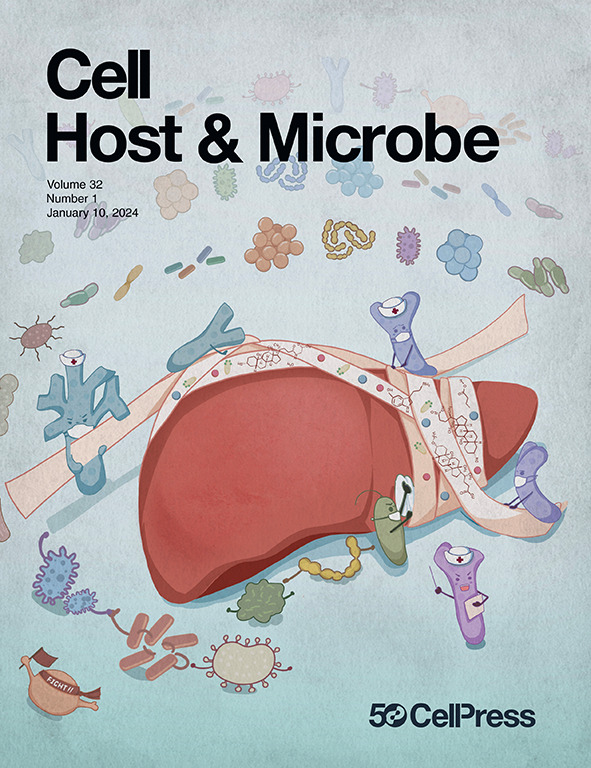用天然无毒菌株预防艰难梭菌病
IF 20.6
1区 医学
Q1 MICROBIOLOGY
引用次数: 0
摘要
艰难梭菌是造成医疗感染的主要原因。肠道菌群失调会促进艰难梭菌感染(CDI),而艰难梭菌感染又会促进肠道菌群失调,导致艰难梭菌感染频繁复发。虽然已经开发出了包括活生物治疗产品在内的预防复发性 CDI 的疗法,但现有疗法成本高昂,而且不能预防原发性感染。在这里,我们展示了一种无毒艰难梭菌分离物 ST1-75,当以 1:1 的比例共同感染毒性 R20291 菌株时,它能保护小鼠免于患上毒性 R20291 菌株诱发的结肠炎。在代谢分析中,无毒的 ST1-75 比有毒力的 R20291 更快地消耗氨基酸,而补充氨基酸会削弱这种竞争优势,这表明 ST1-75 通过消耗氨基酸限制了有毒力的 R20291 的生长。总之,我们的研究将菌株间的营养消耗确定为降低 CDI 发病率的潜在可利用机制,并揭示了 ST1-75 菌株可能是一种生物治疗剂,可预防高危患者的 CDI。本文章由计算机程序翻译,如有差异,请以英文原文为准。

Protection against Clostridioides difficile disease by a naturally avirulent strain
Clostridioides difficile is a leading cause of healthcare infections. Gut dysbiosis promotes C. difficile infection (CDI) and CDIs promote gut dysbiosis, leading to frequent CDI recurrence. Although therapies preventing recurrent CDI have been developed, including live biotherapeutic products, existing therapies are costly and do not prevent primary infections. Here, we show that an avirulent C. difficile isolate, ST1-75, protects mice from developing colitis induced by a virulent R20291 strain when coinfected at a 1:1 ratio. In metabolic analyses, avirulent ST1-75 depletes amino acids more rapidly than virulent R20291 and supplementation with amino acids ablates this competitive advantage, indicating that ST1-75 limits the growth of virulent R20291 through amino acid depletion. Overall, our study identifies inter-strain nutrient depletion as a potentially exploitable mechanism to reduce the incidence of CDI and reveals that the ST1-75 strain may be a biotherapeutic agent that can prevent CDI in high-risk patients.
求助全文
通过发布文献求助,成功后即可免费获取论文全文。
去求助
来源期刊

Cell host & microbe
生物-微生物学
CiteScore
45.10
自引率
1.70%
发文量
201
审稿时长
4-8 weeks
期刊介绍:
Cell Host & Microbe is a scientific journal that was launched in March 2007. The journal aims to provide a platform for scientists to exchange ideas and concepts related to the study of microbes and their interaction with host organisms at a molecular, cellular, and immune level. It publishes novel findings on a wide range of microorganisms including bacteria, fungi, parasites, and viruses. The journal focuses on the interface between the microbe and its host, whether the host is a vertebrate, invertebrate, or plant, and whether the microbe is pathogenic, non-pathogenic, or commensal. The integrated study of microbes and their interactions with each other, their host, and the cellular environment they inhabit is a unifying theme of the journal. The published work in Cell Host & Microbe is expected to be of exceptional significance within its field and also of interest to researchers in other areas. In addition to primary research articles, the journal features expert analysis, commentary, and reviews on current topics of interest in the field.
 求助内容:
求助内容: 应助结果提醒方式:
应助结果提醒方式:


